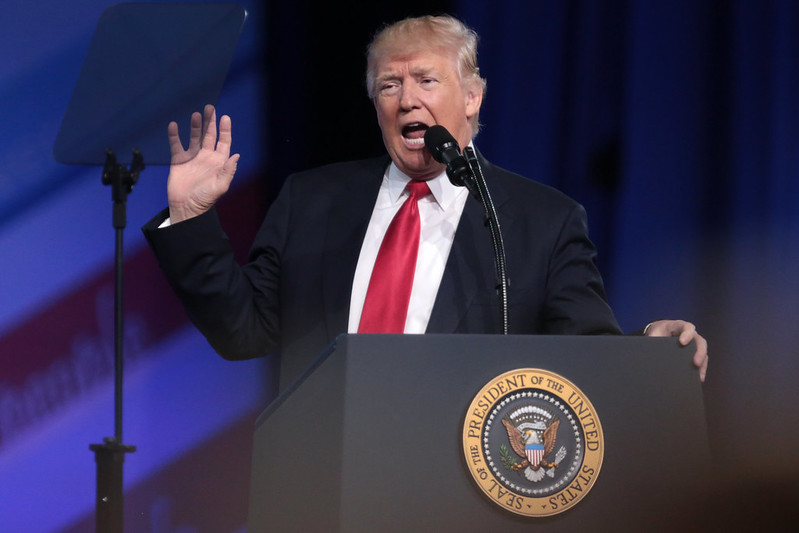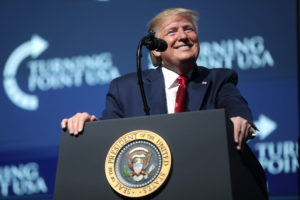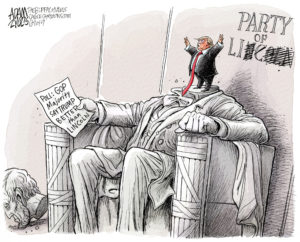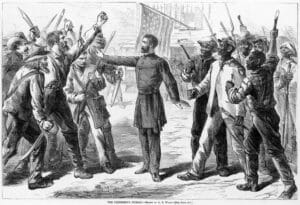Is Trump the Most Corrupt President in American History?
As formal impeachment proceedings begin on Capitol Hill, whistleblower and former federal investigator Bill Black presents his case. Gage Skidmore / Flickr
Gage Skidmore / Flickr
What follows is a conversation between former whistleblower Bill Black and Marc Steiner of The Real News Network. Read a transcript of their conversation below or watch the video at the bottom of the post.
MARC STEINER: Welcome to The Real News. I’m Marc Steiner. Great to have you all with us.
The impeachment hearings are scheduled to begin tomorrow. What could be the Republican defense? I think it was well articulated by Louisiana Senator John Kennedy on Face the Nation this past Sunday.
JOHN KENNEDY: The quid pro quo, in my judgment, is a red herring. Here are the two possible scenarios. Number one, the president asked for an investigation of a political rival. Number two, the President asked for an investigation of possible corruption by someone who happens to be a political rival. The latter would be in the national interest. The former would be in the President’s parochial interest and would be over the line.
I think this case is going to come down to the president’s intent, his motive; did he have a culpable state of mind? For me, Margaret, there are only two relevant questions that need to be answered. Why did the president ask for an investigation?
MARGARET BRENNAN: Mm-hmm.
JOHN KENNEDY: Number two–and this is inextricably linked to the first question–what did Mr. Hunter Biden do for the money?
MARC STEINER: So the Republicans are searching for a defense, but what do they really have? Is there a there there? Many progressives argue that there is no there there with Ukrainegate or “quid pro quo.” Is that real? Republicans are panicking. And on the verge of public impeachment hearings, some argue politically that impeachment might enhance Trump’s chance of victory in 2020; others saying no effect at all, we don’t know any of that. Others support this is the only way to oust him and consider him the most corrupt president in U.S. history.
Some would say, “There are three things.” In one article on Slate: “It’s sex, power and money that are the downfall of the powerful.” Is that the case here? Trump may have all three, but what’s going on here? And what is that there there, that the impeachments will base their work on? We’ll examine how all this corruption may play out, what it might mean and realize ahead of this impeachment hearings. And is it really a precedent for any of this at all? What did we learn from the past?
We’re joined once again by Bill Black, who is associate professor of economics and law at the university of Missouri, Kansas City. He is a white collar criminologist, former financial regulator, author of The Best Way to Rob a Bank is to Own One. And Bill, welcome back. Good to have you with us.
BILL BLACK: Thank you.
MARC STEINER: So what’s your first reactions to Senator Kennedy?
BILL BLACK: Um…
MARC STEINER: That’s what I thought it would be. I knew that was going to be your answer.
BILL BLACK: You see, all you have to say is that “I’m using the power of the United States government to attack at my political opponent because I really think that my political opponent is a bad person,” and then it’s okay; it’s completely kosher. No, that’s not right. Even as a technical matter of law, in fact, this is precisely the kind of thing that the founding fathers cited in the Federalist Papers and such as their great fear, the use of the power of the office for personal gain, particularly in circumstances where one might be making foreign powers happy.
Indeed, one of the earliest impeachments in the history of the United States was for a federal official who was, in that case, involved in machinations with the United Kingdom against the United States of America. So if they try to make that their legal defense, it will fail. But of course law has its limits in the impeachment process, which ultimately is inherently a political act as well.
MARC STEINER: So what do you say to those, even some progressive voices and maybe talk to a few later this week, who would say that there is no real quid pro quo there that this is Ukraine-gate is just kind of nothing. It’d be like Russia-gate. It’s all a waste of time and it’s not getting to the heart of the issue or how do you respond to that when you look at what’s going on around?
BILL BLACK: Trump’s corruption is, I think, in many ways the heart of the issue. He is the most corrupt president in the history of the United States and it’s not even close. Harding and Grant had been relegated to footnotes in history of U.S. corruption. And on top of that, he is the most pro corruption president of any president of the United States.
MARC STEINER: What does that mean?
BILL BLACK: So for example, he came into office with the express goal of weakening as much as possible, the foreign corrupt practices act and the Foreign Corrupt Practices Act is a statute against the bribery of foreign public officials by United States persons, right? Typically, business types. Now, this is one of the best things that we ever adopted. The Foreign Corrupt Practices Act. The Europeans mocked us when we did it originally over 20 years ago saying, “Corruption is the way of the world and you’re just not going to be able to compete with us, you fools.”
In places like Germany, you could not only bribe foreign officials; you could openly declare it as a tax expense on your income tax returns for the corporation. But that changed in the OECD, Organization of Economic Cooperation and Development. Essentially the top 30-ish economies now mandates that you have some version of the Foreign Corrupt Practices Act. Trump as a businessperson hated the act and came into this office determined to weaken it wherever possible. And the administration is weakening it.
MARC STEINER: Now, let me ask you a quick question. It is just to describe something for our viewers for a moment. When you say he weakened it, and when he came in specifically one of the things he wanted to do was to do that, how has he weakened it? What do you mean? Detail that just a little bit for us.
BILL BLACK: So it, it’s in multiple ways but the largest single way is that they’ve redirected enforcement towards minor cases and towards minor penalties. So, that pretty much does it in terms of the Foreign Corrupt Practices Act. They’ve made it a very process oriented as opposed to actually putting the people that bribe public officials, the powerful ones, in prison as we used to do. But on top of that, Attorney General Barr is noted for one thing in particular, historically. He is a leading opponent of the False Claims Act. The False Claims Act allows Americans to bring actions on behalf of the U.S. Government when people through corrupt means are defrauding the United States of America.
So this is whistleblowers. And as you can see, the administration despises whistleblowers because they are the scourge of powerful corruption. And so Barr excoriated whistleblowers as low lives that needed to be crushed and that we should get rid of the entire statute, which by the way was adopted in the Civil War under President Lincoln as a means of preventing corrupt corporations from by bribing public officials to make a fortune. In the case of you Ukraine, you have direct corruption as the goal of the administration. So you have the treasury secretary openly putting cronies who are major political donors to him on the board of Ukrainian oil corporations, which I thought was the criticism of Biden’s side.
And then you have Giuliani with these “associates” who are also under indictment for personal corruption in all of this, in which Giuliani and others are refusing to testify as to what in God’s name they were using their power to try to accomplish. But these folks are indeed very well known. And again, the Department of Justice, the U.S. Attorney’s Office for the Southern district of New York in the indictment has said that they are working in league with organized criminals–leading organized criminals at that–from Russia.
MARC STEINER: And then you have Lev Parnas and Igor Fruman, who are working with Rudy Giuliani, the two Ukrainians who are involved with the mob and money. They went there to say, “Go after Biden and give us some more money.”
BILL BLACK: They went there on an anti-corruption mission, right?
MARC STEINER: Right.
BILL BLACK: So this is hilarious. So whatever Trump does or accuses anyone of doing, just like Charles Keating back in the day used to accuse us as regulators of doing the things type of things that he did. He was convinced that the only reason we could be standing up to his crimes was because we must be a short selling his stock because of course that’s what he would have done as a regulator. Of course, it never entered our minds to try to do any such things. But that’s what he always accused people of, precisely the kinds of things–securities fraud in his context–that he was doing. And so Trump instantly goes to corruption because that is what he does. Indeed, just he settled the case in which he ripped off the charities.
MARC STEINER: Right? Exactly.
BILL BLACK: So this is a profoundly corrupt person whose instinct is always to corrupt the system.
MARC STEINER: So a couple of questions, just taking a step backwards to the impeachment of president Richard Nixon. And a couple of things here; two questions about this. A) is that when that was going on… And there was a much more of a bipartisan push to get through some impeachment going against Nixon. But the Republicans and others, because they were open to hearings, were allowed to question whatever was being brought up by those who were on the committee. The Republicans are arguing they are not given the same rights to do that now. Let’s touch on this. How about that for a second? Because this is going to be a powerfully persuasive argument among the public, especially among those who were saying, “I like Trump. I want to vote for president for Donald Trump.” Or those who may be teetering. So it becomes a major issue. So what is your take on that? Since you’ve been…
BILL BLACK: Okay. So let’s divide it up. First there was the Republican freak out about the fact that they were taking depositions in front of the committee members, but not in front of the cameras. Right?
MARC STEINER: Right.
BILL BLACK: That was under rules adopted by the Republicans. Those are literally the rules adopted by the Republican leaders of the house of representatives. To say that this was an outrage, it is a hilarious, in fact, of course everybody uses the analogy. Indeed, you can go on the official website of the house, and this hasn’t changed under Democrats, and you’ll see that they explain that it the house functions like a grand jury in the impeachment process. And as people know, the grand jury is a process in which you don’t tell the public what questions they are asking so the criminal suspects can’t coordinate their testimony.
In any event, the rules of the Democrats have now adopted for the open phase of the investigation give far more rights than any rules in the past that either the Republicans or Democrats have used on impeachment. So, you know, that whole thing is going to be mooted out. Now what you are going to have is something we have never seen before in the impeachment process. People trying to turn it into gorilla theater. This was wonderful, a fake takeover of the and such. And you’ve seen the special appointment of Jim Jordan, the disgraced former wrestling coach of Ohio State because he’s quite willing to do anything and everything for Trump and he’s … so he’s clearly going to try to stage guerrilla theater. And he’s going to try to out the whistleblower to intimidate not just the whistleblower but more importantly from their perspective, anybody from being a future whistleblower.
They’re going to attack the Biden’s even though that actually has nothing to do with all of this. It’s simply a pretext for the use and abuse of the power. Again, you don’t need a quid pro quo looks like the Democrats are finally waking up and not using that as a trap. Using both the Latin which the public doesn’t understand and the fact that you don’t need a this for that under this provision. It has long been known that this is an abuse whether you get something in return. Simply the attempt to use governmental power for personal gains against political opponents is more than sufficient to establish the grounds for impeachment and indeed for conviction in the Senate.
MARC STEINER: So before we run out of time–we’re close to our time limit here. You raised the issue of Jordan and maybe others outing the whistleblower. Supposing that happened, what would that mean? And in terms of both a whistleblower and in terms of, you know, just exposing this and you alluded to that in your comments. So talk just for a moment very quickly about what that would mean if that actually happened. Because it could very well happen, them finding out who it is and letting it out.
BILL BLACK: Yes. They claim to have already found out and they, you know, put it on Twitter and things like that. So I’m a serial whistleblower and a co-founder of Bank Whistleblowers United. What we’ve found is a unique asset of the United States compared to other nations is we have many more people willing to speak truth to power in circumstances even when it really is very threatening if your identity comes out. My two co-founders of Bank Whistleblowers United are these super bankers who did everything right. Their warnings proved to be absolutely correct.
They didn’t try to be whistleblowers, they tried to warn people internally to do the right thing and such. And now 11 years later, they remain unemployed and unemployable in every aspect of the financial industry in the United States, which is their home. So this effort is to punish this whistleblower. Not even so much for their hate of this whistleblower that I’ve though obviously they do, but to deter future whistleblowers that will out future crimes or existing crimes we don’t know about yet of this administration. That’s what they’re desperate to do. That’s the whole goal.
And then, of course, they will smear that person to demonstrate how miserable they can make their life–again, as a way of deterring future folks. That’s what’s at issue. And anybody who is interested in speaking truth to power ought to be powerfully against this kind of abuse of the system. And again, we have never had in any of these impeachment outcomes this willingness on the part of one party, not only to defend conduct that they know is in fact actually criminal, but to also destroy the people with integrity who did try to speak truth to power. And that is shameful.
MARC STEINER: Yeah. And there’s a vast difference here. Maybe next time we get into a bit more between what’s happening here and what happened with Richard Nixon, which was this bumbling, idiotic move to go after a person who’s going to defeat anyway and breaking into his offices. But this is actually if true conspiring with another government to go after it. Another political figure in this country.
BILL BLACK: And sent to extort that foreign government in this context.
MARC STEINER: Exactly, extort. So Bill, it’s always a pleasure to talk to you. I look forward to talking right to more about this with you as this unfolds and hearing your thoughts and ideas and analysis. But Bill Black, always going to talk to you. Thank you so much for being with us once again.
The hearings begin tomorrow. We’ll be covering what goes on there; George Kent, Marie Yovanovitch. And we can tell you who will be testifying tomorrow, as we’ll have folks coming on this week to debate more of that. Several different sides of looking at what’s going on with these impeachment hearings. So stay tuned, follow that, and thank you all for joining us.
I’m Marc Steiner here for The Real News Network. Take care.
Your support matters…
Independent journalism is under threat and overshadowed by heavily funded mainstream media.
You can help level the playing field. Become a member.
Your tax-deductible contribution keeps us digging beneath the headlines to give you thought-provoking, investigative reporting and analysis that unearths what's really happening- without compromise.
Give today to support our courageous, independent journalists.






You need to be a supporter to comment.
There are currently no responses to this article.
Be the first to respond.